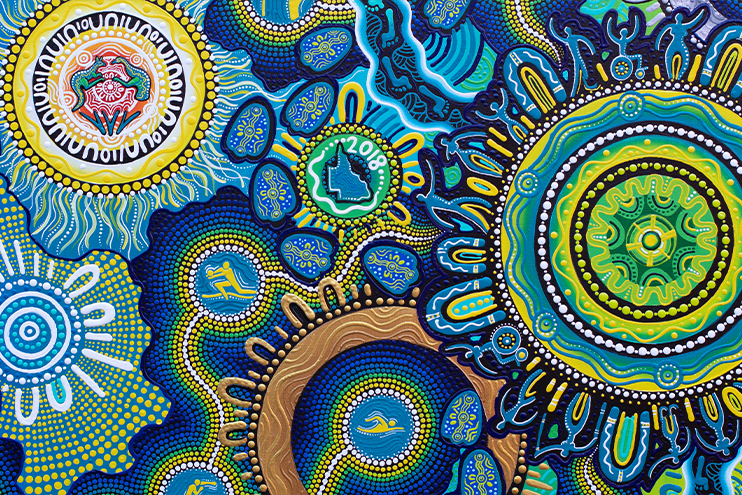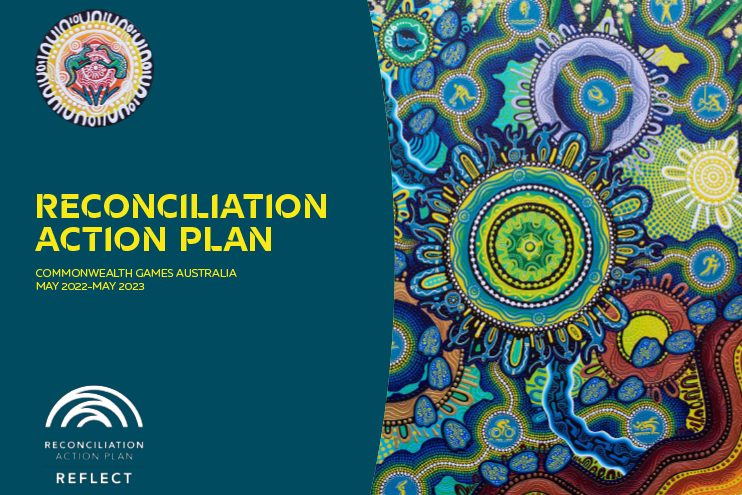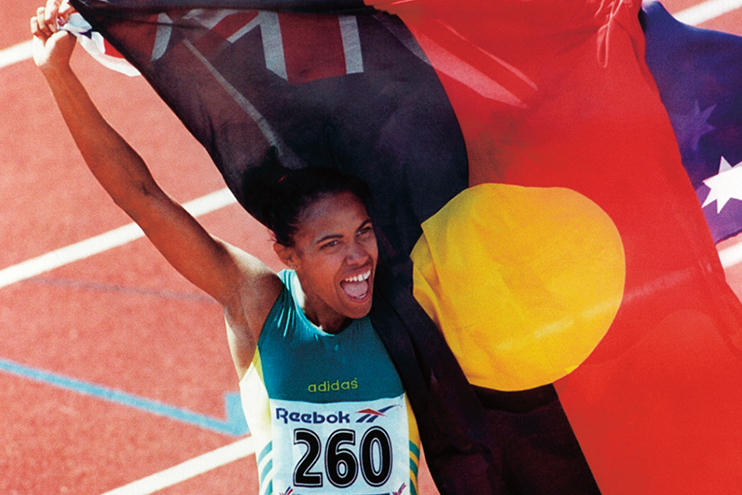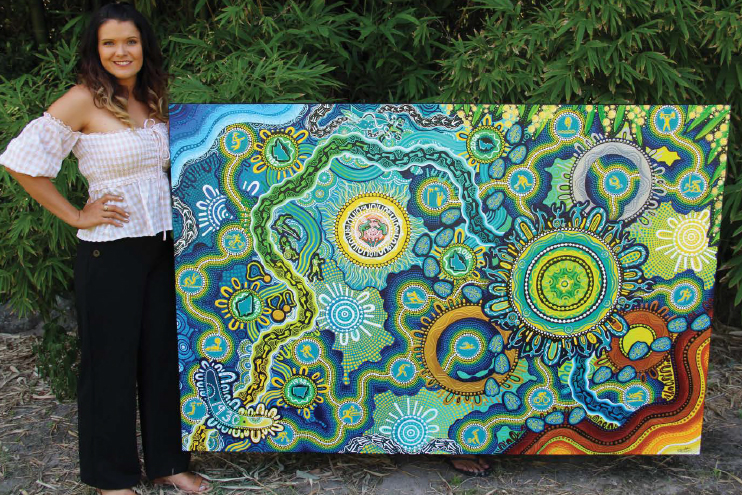
*Content Warning: Aboriginal and Torres Strait Islander readers are warned that the following article contains links to images of deceased persons.
Commonwealth Games Australia continues its commitment to being an active participant in Australia’s reconciliation journey with the launch of its Reconciliation Action Plan.
Australia’s First Nations peoples proud, but at times troubled history as Commonwealth Games athletes has been catalogued and compiled for the first time with the launch of Commonwealth Games Australia’s Reconciliation Action Plan (RAP).

Commonwealth Games Australia Reconciliation Action Plan
Commonwealth Games Australia continues its commitment to being an active participant in Australia’s reconciliation journey with the launch of its Reconciliation Action Plan.
READ MOREAustralia has a strong and proud history of Aboriginal and Torres Strait Islander athletes competing in the Commonwealth Games, with our athletes creating some of the most iconic moments in Australian sporting history.
From our first Aboriginal and Torres Strait Islander representatives, including our first gold medallists Percy Hobson (athletics) and Jeff ‘Mitta’ Dynevor (boxing) at the Perth 1962 British Empire and Commonwealth Games, to our first Para-sport representative, Ray Barrett at the Commonwealth Paraplegic Games in Edinburgh, Scotland in 1970, through to Cathy Freeman’s history-changing flag carrying moment at the Victoria 1994 Games which started a national conversation about reconciliation, the story of our First Nations athletes has been intrinsic to our history.
Since then, many Australian athletes have felt safer to celebrate their Aboriginal and Torres Strait Islander heritage in Australian sporting teams with 43 First Nations athletes representing Australia at the Commonwealth Games.

ABORIGINAL AND TORRES STRAIT ISLANDER TEAM MEMBERS HISTORY
Australia has had a strong and proud history of Aboriginal and Torres Strait Islander athletes competing in sport, including at the Commonwealth Games, with our athletes creating some of the most iconic moments in sporting history.
READ MOREThe Commonwealth Games Australia ‘Reflect’ RAP was launched on the opening day of National Reconciliation Week at the Commonwealth Games Australia Annual General Meeting by Kyle Vander-Kuyp (athletics) who served as a member of the RAP working group.
For Vander-Kuyp, a proud Worimi and Yuin man and four-time Commonwealth Games representative, being part of the RAP working group was a rewarding experience.
Building on from the Gold Coast 2018 Commonwealth Games, where the event had a first-ever Reconciliation Action Plan for a multi-sport Games, the CGA RAP seeks to embed the values of reconciliation into CGA activities.
COMMONWEALTH GAMES AUSTRALIA’S VISION OF RECONCILIATION
Our reconciliation vision is to work together with Aboriginal and Torres Strait Islander peoples to embed the values of reconciliation
into the Commonwealth Games Australia organisation and our Team, celebrate the contribution and achievements of
Aboriginal and Torres Strait Islander athletes and inspire participation and equality through sport.
Vander-Kuyp said he was proud to see the continuation of the Gold Coast Games reconciliation activities live on.
“To be a spectator with my family up at the Gold Coast Games in 2018, it made me proud to see First Nation culture and people represented and acknowledge in such a beautiful and respectful way.
“For my young kids to see culture celebrated this way is where we will all get to one day as a country when Aboriginal and Torres Strait people and cultures are embraced and accepted, and everyone has pride.
“This RAP now picks up and continues the journey, so that when a young athlete puts on the green and gold in the future and knows the rich beautiful history of the country they are representing and walks proudly with an awareness they come from a country that has existed for over 80 thousand years… this will be a thing to witness,” Vander-Kuyp said.
The launch coincided with the unveiling of the CGA RAP artwork, created by Chern’ee Sutton, a proud Kalkadoon woman and artist from Mount Isa, QLD, who was an artist in residence at the Athletes’ Village on the Gold Coast and drew the markings on the hands and feet of 2018 Games mascot Borobi.
The artwork features stylised versions of the unity symbol from the Gold Coast 2018 Commonwealth Games RAP, a First Nations version of the CGA logo and milestone moments such as Freeman’s carrying of both flags.

Artwork captures reconciliation journey
Chern’ee Sutton, a contemporary indigenous artist from the Kalkadoon people of Mt Isa, Queensland, has created a stunning artwork to represent Commonwealth Games Australia’s reconciliation journey.
READ MORERAP Working group chair, Steve Moneghetti AM, said the development of the RAP was an important milestone for CGA and much work had already commenced flowing from the committee’s ideas and enthusiasm.
“As an athlete, coach and administrator I have seen how Commonwealth Games Australia and its representative teams have trodden the path of reconciliation over the last thirty-five years.
“I was sitting with the person who handed Catherine the Aboriginal flag at the 1994 Games and I see Cathy’s actions as a significant moment in the reconciliation journey. I also saw how the Team leader treated discrimination in his time and watched as the Federation and our organisation celebrated our Aboriginal and Torres Strait Islander history as Mayor of the Village at the 2006 Melbourne Games and Chef de Mission on the Gold Coast.
“The Reflect RAP is a way for us to recognise and acknowledge the significant contribution that Aboriginal and Torres Strait Islander peoples have made to the Commonwealth Games movement; many such actions have not only enriched our organisation and teams but have changed the fabric of Australian society forever and extend far beyond the sporting arenas.
“We are proud of how far we have come on our reconciliation journey. However, we acknowledge we need to do more,” Moneghetti said.
Commonwealth Games Australia President Ben Houston said the organisation was committed to implementing the defined actions over the next twelve months.
“Commonwealth Games Australia was proud of the role we played in the development and delivery of the Gold Coast 2018 Reconciliation Action Plan, a first for a multi-sport Games. We valued our participation in the reconciliation activities in the lead up to and during the Gold Coast Games and our ongoing relationship with the Yugambeh Elders and Yugambeh Museum is valued highly by CGA.
“From our first Aboriginal team members and gold medallists Percy Hobson (athletics) and Jeff ‘Mitta’ Dynevor (boxing) in Perth in 1962 through to our more recent champions such as Nova Peris and Benn Harradine (athletics) and Taliqua Clancy (beach volleyball) we are proud of the role Aboriginal and Torres Strait Islander athletes have played in our history.
“However, we also acknowledge this history has not always been smooth.
“As an organisation, and for our Australian Team, we seek to embed the five dimensions of reconciliation into everything we do – historical acceptance; race relations; equality and equity; institutional integrity and unity. Listening to the voices of Indigenous alumni and community members, we will inspire opportunity and unity through our sporting network.
“We continue to share the passion, pride and history of our athletes’ achievements past and present and Commonwealth Games Australia is looking forward to delivering the next hamper in our history in our actions over the next twelve months, with a particular focus on our team in Birmingham at the Games in 2022,” Houston said.
Reconciliation Australia CEO Karen Mundine said Reconciliation Australia welcomes Commonwealth Games Australia to the Reconciliation Action Plan program with the formal endorsement of its inaugural Reflect RAP.
“CGA joins a network of more than 1,100 corporate, government, and not-for-profit organisations that have made a formal commitment to reconciliation through the RAP program.
“This Reflect RAP enables CGA to deepen its understanding of its sphere of influence and the unique contribution it can make to lead progress across the five dimensions. Getting these first steps right will ensure the sustainability of future RAPs and reconciliation initiatives, and provide meaningful
impact toward Australia’s reconciliation journey.” Mundine said.
Commonwealth Games Australia activities underway
Following the Gold Coast Games and the commencement of the CGA RAP process and since its conditional approval by Recompilation Australia, CGA has a completed and commenced a number projects and activities, including:
- The continued close working relationship with the Yugambeh Region Aboriginal Corporation Alliance and the Yugambeh Museum.
- The appointment of Borobi as Team mascot for the Birmingham 2022 Games, continuing his legacy from the Gold Coast Games.
- Commonwealth Games Australia has an Aboriginal and/or Torres Strait Islander athlete (Gold Coast beach volleyball silver medallist Taliqua Clancy) on our Athlete Advisory Group and two Alumni members on our RAP Working Group (Katie Mitchell Sigsworth – Rhythmic Gymnastics and Kyle Vander-Kuyp – Athletics).
- Commonwealth Games Australia has continued our Gold Coast 2018 partnership with Griffith University in establishing the Ron Clarke Griffith Futures scholarship to support two young Indigenous student-athletes who are studying at Griffith University. The scholarship is funded by Commonwealth Games Australia, in partnership with Griffith University, and is a legacy of the partnership between the two organisations at the Gold Coast Commonwealth Games.
- Commonwealth Games Australia is an active participant in a range of programs at the domestic, regional and international level. Domestically, CGA’s WA Division conducts the annual Champions 2 Country program which visits Indigenous areas in remote regions of WA and is seeking to expand this program in other states.
- Internationally, we are working closely with the Commonwealth Games Federation with their reconciliation activities with First Nations people across the 72 territories from the 54 nations of the Commonwealth.
Commonwealth Games Australia thanks the Commonwealth Games Federation’s Commonwealth Sport Foundation, through which funding from their Games Changers Grant Program has contributed to the development of our RAP.
Reconciliation Action Plan Working Group
Commonwealth Games Australia formally thanks the RAP Working group for their time, energy and expertise in the development of the CGA Reflect RAP.
The group consisted of members of the CGA Alumni including Indigenous members Katie Mitchell Sigsworth (Rhythmic Gymnastics – 1994), Kyle Vander-Kuyp (Athletics – 1990, 1994, 1998, 2006), along with fellow CGA alumni Matthew Haanappel OAM (Swimming – 2018) and Cassie Woods (nee McCall, Archery – 2010).
They were joined by former Gold Coast Commonwealth Games Manager Executive Operations Travis Couch and Gunaikurnai Traditional Owner Brian Stevens.
The group was chaired by four-time Commonwealth Games representative, three-time Australian team Chef de Mission, Melbourne 2006 Athletes Village Mayor and CGA Board member Steve Moneghetti AM, with the support of fellow Board member Jayne Ferguson.
The project was guided by Yorta Yorta woman and experienced RAP consultant Karen Milward Consulting in conjunction with Commonwealth Games Australia’s Community Engagement Managers, Glasgow 2014 Commonwealth Games gold medallist Natalie Medhurst (Netball – 2010, 2014) and from October 2021 Alexandra Cole.
The Project was being led by CGA’s General Manager of Marketing, Communications & Community David Culbert (Athletics (1986, 1990, 1994).
